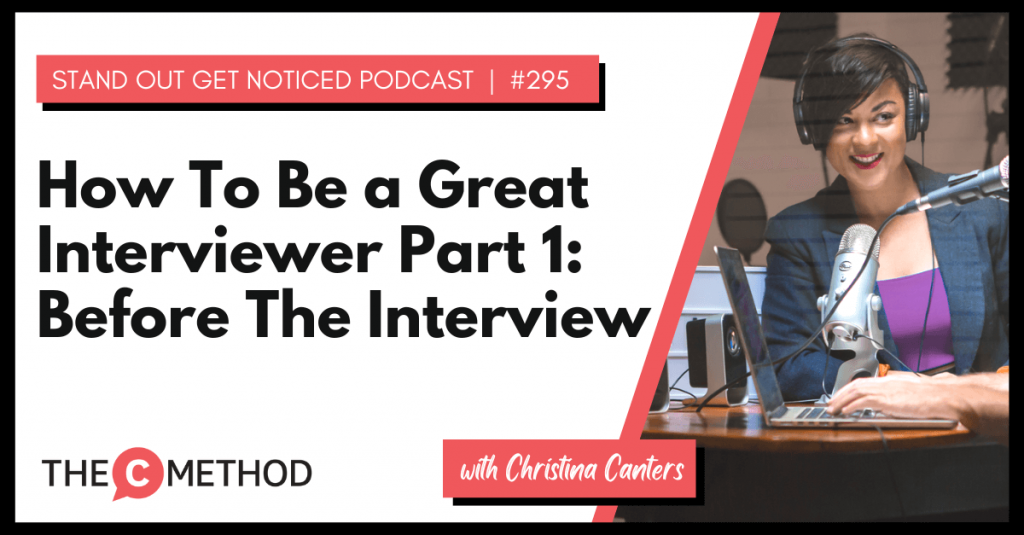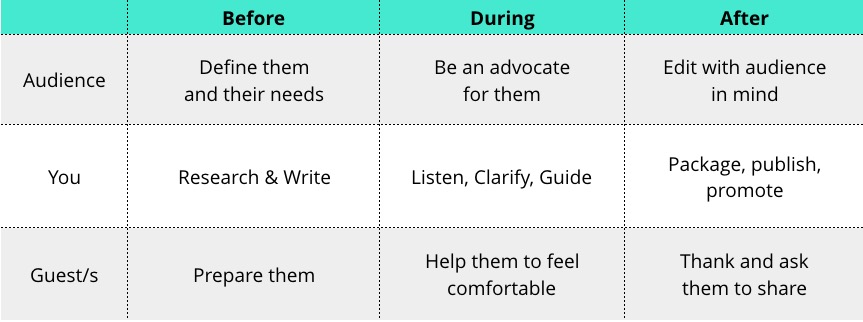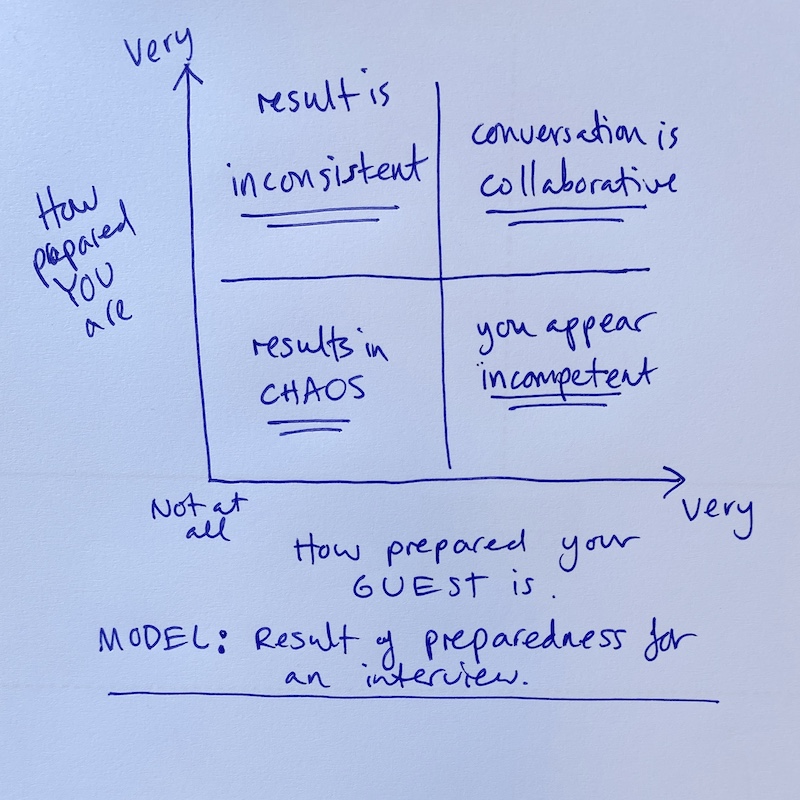
Learning how to be a great interviewer is a wonderful skill to add to your communication toolkit. Interviews can be a great way to share stories, connect with others and hone your active listening skills.
And having interview skills can help you in different areas of your work – such as running meetings, having 1:1 conversations, and answering Q&A. Whether you already are doing interviews as part of a podcast, panels or webinars, or if you’re thinking about giving them a go, you’ll discover some key techniques you can implement to improve your conversational abilities and be a great interviewer!
In this episode, I’m going to focus on the preparation stage (BEFORE the interview), which is key to setting yourself up for a great interview. I’ll be sharing the techniques I’ve learnt from conducting over 250 interviews, as well as what I teach our government, academic and corporate clients through my podcast development and training business, Podcast Services Australia.
This episode was inspired by podcast listener Emma, who requested this topic!
In the next episode, we’ll focus on what to do DURING the interview itself. See below for a table showing an overview of what’s required at each stage of an interview:

Components of an interview
In any interview, there are 3 people we need to consider:
- You (the interviewer)
- The guest/s (also known as Talent)
- The audience
Can you guess which person is the most important?
It’s the AUDIENCE member. After all, they are the person you want to impact, right? So before you do anything else, your very first step is to determine who your audience member is. This will determine the content or direction of your podcast.
How to prepare yourself:
We get asked a lot how much preparation is needed for an interview. And it really depends on the format of the interview. For straight Q&A interviews that don’t have a lot of time, preparation is key and it’s best to have mostly prepared questions.
On the other hand, if it’s a longer form, conversational interview, then you don’t need to be so prepared and structured. Think about it: how much do you prepare for your day-to-day conversations? Do you script out every question? Of course not! So the challenge is to not get too caught up in preparing the exact conversation flow to within an inch of its life, then trying to follow it exactly and then freaking out if it doesn’t go to plan.
How much you choose to prepare for yourself is dependent on your personality. If you need to be super prepared in order to feel comfortable, then go for it. If you’re naturally a more go-with-the-flow person, then just write a few questions to keep you on track. I personally write down about 5-7 questions and keep them as a backup in case I run out of things to say!
You may like to script your opening question and wrapping up line – this helps you to start and end strong, which is great for boosting your own confidence and coming across and assertive and organised!
Tips for researching your guest:
- Pick a good speaker or someone you’re comfortable with for your first few interviews (not sure if they’re a good speaker? Have a regular conversation with them. If they ramble on or don’t listen to you…then maybe choose someone else :P))
- Look at their website and any content they create
- Check out their socials – what are they posting on LinkedIn, Insta or Twitter? What interests them right now? Your guest will have so much respect for you if you show you’ve done your research.
- I like to have a quick listen to other interviews they’ve done and think about how I can make my interview more fun or different. It’s a good way to see if they are a good speaker too.
- My friend Tiff Cook from the very popular Roll with the Punches podcast doesn’t like to do too much research, as she likes to stay curious without knowing too much of her guests’ back stories. (Listen to our episode together on what Tiff has learned from doing over 400 interviews) So it’s really up to you!
How to prepare your guest:
This also depends on the guest. If they are a seasoned speaker and have done loads of interviews previously, they most likely will already feel comfortable with the process. If it’s someone’s first time, they may need more hand holding and reassurance. Which means you have to communicate very clearly about the process. When reaching out to your guest, include:
- What the interview is for and where it will be published
- The goal of the episode
- Who the audience is
- How long the interview will take
- The method – is it audio only? Will you be filming video?
- Will it be edited later?
- Technical elements – do they need to wear headphones? (answer is always YES!)
On the day of the interview, remind your guest of the audience and the end objective. This will help to keep them on track. It’s also a good idea to get them to put on their headphones and talk for 10-15 minutes before hitting record. This will help them get warmed up and feel comfortable.
Model of Preparedness:
Below is a model I created representing what happens at different levels of preparedness. As you can see, it’s best that both you AND the guest are prepared!

So there you go! My tips for how to be a great interviewer (part 1).
This is not an exhaustive list, but it’s a good starting point. In the next episode, I’ll discuss what to do DURING the interview. I’ll share tips for how to be engaging, how to keep the conversation flowing, what to do if the guest talks for too long and more.
Until then, have fun prepping for your next interview and remember – the most important person in the interview is your audience.
Leave a Reply